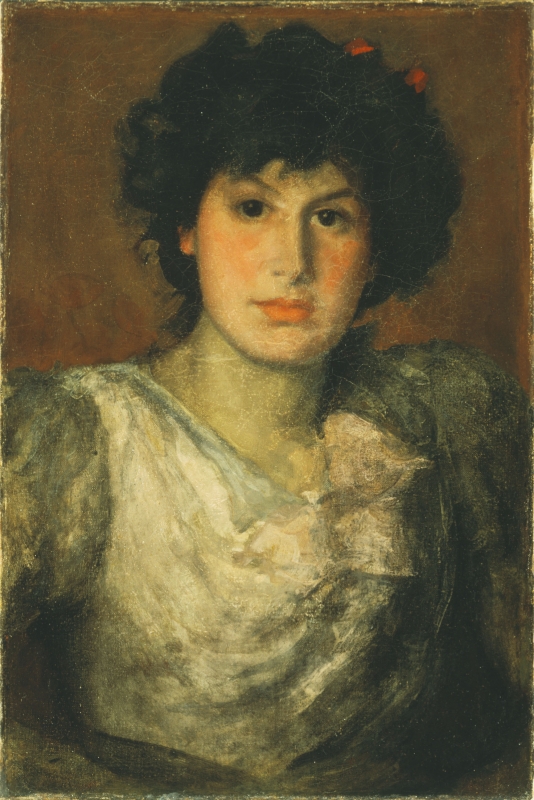Home > Catalogue > Browse > Portrait of Miss Lilian Woakes << >>
Provenance
- 1892/1893: commissioned by the sitter's father, Edward G. Woakes (1837-1912), London;
- In or by 1911: sold to A. J. Sully & Co.;
- 1911: sold by Knoedler's, New York art dealers, to Henry Reinhardt (1859–1921), New York art dealer;
- 1914: bought back by Knoedler's;
- 1916: sold by Knoedler's to Nathan Allen Jr (1855-1924), Kenosha, WI;
- 1917: returned to Knoedler's;
- 1920: sold by Knoedler's to Duncan Phillips (1886-1966) for the Phillips Memorial Gallery.
According to dealers' records, it was bought from Woakes by A. J. Sully & Co., who sold it to Knoedler's. It was with Henry Reinhardt in November 1911 and exhibited in New York in 1911 and Buffalo in 1912. 1 Knoedler's bought it on 18 March 1914, and exhibited it in New York in 1914 (cat. no. 3) as 'Miss Lilian Wookes [sic]' for sale at $22,000. 2 Nathan Allen bought it from Knoedler's in October 1916, but returned it in January 1917, and it was finally sold by Knoedler's to the Phillips Memorial Gallery in July 1920. Knoedler's account numbers are: NY 13451 (ON 12468), and NY 14054.
The Phillips Collection website gives an interesting insight on the purchase, suggesting links to the work of European masters including Diego Rodriguez de Silva y Velázquez (1599-1660), Jean-Désiré-Gustave Courbet (1819-1877), and Hilaire-Germain-Edgar Degas (1834-1917), and Americans including Thomas Eakins (1844-1916) and Winslow Homer (1836-1910):
'In purchasing Miss Lillian Woakes in 1920, his first Whistler painting, Duncan Phillips may have been inspired by Freer's 1919 bequest to the nation of his substantial art collection, which included more than three hundred works by Whistler. In selecting this portrait he showed his preference for those aspects of Whistler's work that link him to the realism of Courbet and Degas, and to the earlier naturalism of Velázquez. Phillips appears to have been drawn to the remarkable balance between the artist's purely decorative concern for a harmonious arrangement of color, tonality, and accents and his desire to convey the forthright personality of his subject. In the 1930s and 1940s, Phillips often hung the portrait with the works of French painters such as Corot, Degas, and Daumier, but by the 1950s and 1960s Phillips placed the portrait with American masters such as Eakins, Fuller, Homer, and Inness. In A Collection in the Making, Phillips wrote:
“Miss Woakes,” however, is not a mere pretext for a color scheme, and not a Japanese conception of the figure as an arabesque, nor a graceful form enveloped in shadowy air. She is a robust blooming English girl in whose vitality and subtle spirit the artist seems to have forgotten himself, striving only for the plastic "presence"and for an expression of the "eternal feminine" '. 3
Exhibitions
- 1905: Memorial Exhibition of the Works of the late James McNeill Whistler, First President of The International Society of Sculptors, Painters and Gravers, New Gallery, Regent Street, London, 1905 (cat. no. 20) as 'Lilian, daughter of E. G. Woakes Esq. M.D.'
There is no record of an exhibition in Whistler's ;lifetime.
Notes:
1: American Art News, 25 November 1911; International Studio, 1912, repr. p. lxxv; Buffalo Academy Notes 1912[more] (cat. no. 149).
2: Annotated catalogue, University of Michigan Museum of Art, Ann Arbor.
3: Phillips, Duncan, A Collection in the Making, New York, 1926, p. 111, quoted in the Phillips website at http://www.phillipscollection.org.
Last updated: 14th October 2020 by Margaret





